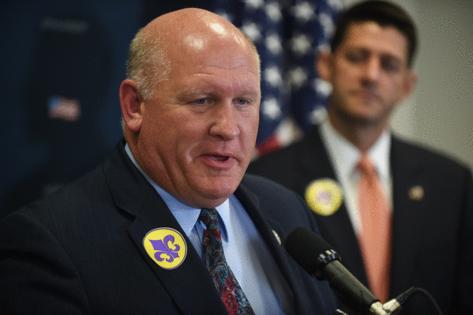Amid court review, Trump says tariff revenue can aid farmers
Published in Political News
WASHINGTON — President Donald Trump said Thursday he would use tariff revenue to provide aid to farmers, but his promise may be premature as the Supreme Court considers whether he has the constitutional authority to set the levies.
“We’re going to take some of that tariff money that we’ve made, we’re going to give it to our farmers, who are, for a little while, going to be hurt, until it kicks in, the tariffs kick in, to their benefit,” Trump said to reporters in the Oval Office.
The Tax Foundation, a nonpartisan group, estimated this month that the tariffs will increase tax revenue by $171.7 billion in 2025 — provided the Supreme Court doesn’t find them illegal. The court is scheduled to hear arguments in November on whether the president has the authority to levy the tariffs.
Critics say tariffs are a tax and only Congress has the authority to raise taxes.
House Agriculture Chairman Glenn “GT” Thompson, R-Pa., described U.S. agriculture as “devastated” in a statement about Trump’s tariff proposal.
“President Trump is right to support them and step in to provide a bridge to the enhanced farm safety net policies in HR 1, which will kick in next year,” he said referring to the bill that became the reconciliation law. “I’m committed to working with the Trump Administration to support farmers and rural America during critical economic times.”
Trump’s tariffs during his first term reduced agricultural exports by more than $27 billion, according to the Department of Agriculture. China accounted for the largest decline, and soybeans were hit the hardest. The administration provided about $28 billion in aid to compensate farmers.
The first Trump administration turned to the Commodity Credit Corporation to provide the aid. But the Congressional Budget Office estimated in July that starting in fiscal 2026 the reconciliation law would use up its annual $30 billion borrowing cap to finance the law’s increased spending on commodity price supports, agricultural disaster aid, conservation and other purposes.
If the administration found its collection of tariffs blocked by the court, it could turn again to the CCC, but lawmakers would first have to replenish it.
He Yadong, a spokesperson for the Chinese Commerce Ministry, urged the U.S. Thursday to drop the tariffs. “Regarding the trade of soybeans, the United States should take positive action to cancel the relevant unreasonable tariffs to create conditions for expanding bilateral trade,” he said at a news conference.
Agriculture exports have been declining since 2022, with the agricultural trade deficit forecast to rise above $45 billion in fiscal 2025. The USDA projected that the deficit would fall to $41.5 billion in fiscal 2026 largely because imports are falling faster than exports.
_____
©2025 CQ-Roll Call, Inc., All Rights Reserved. Visit cqrollcall.com. Distributed by Tribune Content Agency, LLC.
























































Comments